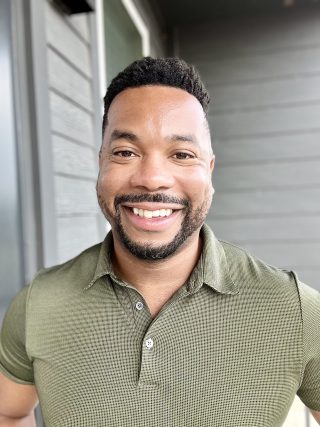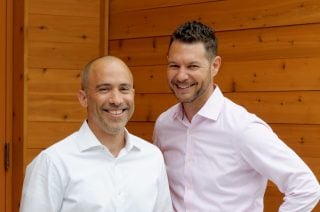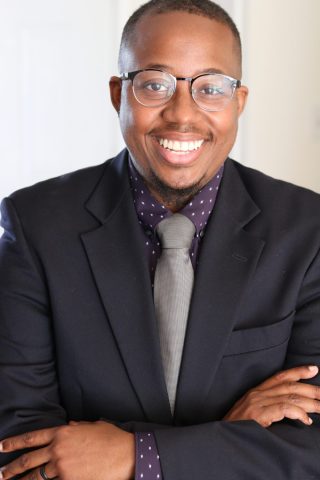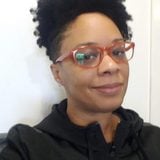6 LGBTQ+ Financial Influencers to Follow in 2023
LGBTQ+ financial pros offer advice for building generational wealth, starting a business, family planning and affordable housing.

Many, or all, of the products featured on this page are from our advertising partners who compensate us when you take certain actions on our website or click to take an action on their website. However, this does not influence our evaluations. Our opinions are our own. Here is a list of our partners and here's how we make money.
The investing information provided on this page is for educational purposes only. NerdWallet, Inc. does not offer advisory or brokerage services, nor does it recommend or advise investors to buy or sell particular stocks, securities or other investments.
People in the LGBTQ+ community experience unique economic disparities that cisgender straight people and heteronormative families do not. According to a 2019 Williams Institute analysis of Behavioral Risk Factor Surveillance System data, 22% of LGBTQ+ adults in the United States live in poverty, compared with an estimated 16% of their cisgender straight counterparts.
LGBTQ+ financial pros are uniquely positioned to share their knowledge and relate it to their individual experiences of queerness because of these disparities and the political climate affecting their communities.
We talked to some financial influencers from the LGBTQ+ community about tips on finding affordable housing, starting a business, building generational wealth and finding resources for family planning.
Responses have been edited for length and clarity. Learn more about each financial pro below, following the questions.
Meet MoneyNerd, your weekly news decoder
So much news. So little time. NerdWallet's new weekly newsletter makes sense of the headlines that affect your wallet.
Are there specific resources available for people in the LGBTQ+ community who are on an entrepreneurial path or interested in starting a business?

Bitches Get Riches: “Yes! Here's the thing: Queer people are so damn good at taking care of their own. If there are two coffee shops on the same street, and one hangs a rainbow flag in the window, guess which one gets my business? Queer entrepreneurs start with a built-in base of extremely loyal potential customers, supporters, mentors and investors.
“A lot of cities host first-time business owner classes through their public libraries and state universities. Take a class, find a mentor, develop your business ideas like everybody else — then leverage your queer community to support you.”

Travers Johnson (Queerency): “When I first became interested in starting a business, it was hard to find queer possibility models. I didn’t see much LGBTQ+ representation in business media, and I didn’t know where to begin to find support to help me as a queer founder. Here are some of the organizations and resources I’ve come across along my entrepreneurial journey:
- "The Balance Sheet" is my weekly newsletter highlighting the latest LGBTQ+ business news.
- Lesbians Who Tech, StartOut and Out in Tech are all great organizations that specialize in empowering and supporting LGBTQ+ startup founders and techies.
- Pride Fund, Gaingels, Backstage Capital and LGBT+ VC are great resources for funding and venture capital.
- NGLCC, the National LGBT Chamber of Commerce and its affiliated chapters do a lot of great work in certifying and supporting LGBTQ-owned businesses on the national, state and local levels.
- Queer Business Alliance is a nonprofit that equips LGBTQ+ entrepreneurs with resources to start, grow and thrive in business.
- Out Leadership and Out & Equal do great work in bolstering LGBTQ+ corporate leaders.
- LGBTQ+ Business Week (November 1-7) is an annual seven-day celebration of queer-owned small businesses aimed at increasing visibility of and empowering LGBTQ+ entrepreneurs."
What is your advice for LGBTQ+ people who are looking for affordable, inclusive places to move and/or retire? Any practical advice for balancing safety with a high cost of living?

Debt-Free Guys: “Unfortunately, most of the 'Best Places for LGBTQ+ People to Live' lists are the most expensive, top-tier cities in the world, and are often too weighted on the quality of the nightlife. When it comes to coupling affordability with LGBTQ+-friendliness, LGBTQ+ people should be as open-minded about cities and towns as we want people to be about us.
“We suggest looking at the Human Rights Campaign's Municipal Equality Index or the Movement Advancement Project Data on LGBTQ+ inclusion and protection in local policies and bumping them up with general affordability metrics, including but not limited to the cost of living, housing affordability and incomes. Even giving equal weighting to all metrics, most will find that the cities of refuge for many LGBTQ+ people will be priced out.
“On the 'Queer Money®' podcast, we're publishing a bonus episode each Thursday that shares the most affordable LGBTQ+-friendly city in each state and its runner-up. The findings, so far, have been interesting, but with a little open-mindedness, we think there are more options for LGBTQ+ people than we tend to believe.”

K. Kenneth Davis (The Trans Capitalist): “I feel this is a classist question, as most of the queer community, especially queer people of color, do not have access to or the means to move and/or retire.
“In this recession and with high mortgage rates, I advise people to move only if their lives are in danger. Sadly, most inclusive spaces are in expensive states and cities. For example, California and New York are very inclusive, but the rent and mortgages for these states are through the roof. Still, you have affordable housing in states like Georgia and Texas, but your safety is at risk. It's a catch-22. Don't beat yourself up, but give yourself a timeline for saving the necessary money to move so you are not solely relying on your savings.”

Daniella Flores (I Like to Dabble): “My wife and I moved from Missouri to Washington, and while there was a considerable increase in the price of housing, everything else actually ended up either being the same or a little less. For instance, our housing expenses increased by 100% but our utilities decreased by 50% (and no state income tax). When we were researching areas to move to, we looked at states that were LGBTQ+- friendly and found the Movement Advancement Project helpful.
"We also planned for about a year up to the actual move and spent a lot of time researching how we were going to swing the difference in the cost of living. Our side hustles helped us save up for it, and once we got here, things equalized. However, it won't be the same for everyone. I would advise diving into deep research on not just the housing costs, but the overall cost of living, and trying to find people in those areas to talk to about what to expect."
What is your advice for people in the LGBTQ+ community looking to build generational wealth?

Carmen Perez (Make Real Cents): “Build up an emergency fund. Having a soft cushion to land on should a medical emergency arise, you're laid off or it's taking longer than expected to land that next gig, is crucial. An emergency fund can not only alleviate financial stress but also help combat taking on unnecessary debt, which pushes out your ability to build wealth.
"Start investing early and often, adding assets that will appreciate and add to your net worth. You don't need a lot of money to get started with investing. You have to prioritize it and do it consistently as soon as possible. The more time (and money) you have in the market, the better.”
Debt-Free Guys: “Too much of LGBTQ+ people's wealth eventually ends up in the hands of our non-LGBTQ+ family members, and too often family members who weren't totally supportive of us. The first step is that we need to start talking about it, and then we need to start taking the steps to do it. Marrying our partners is one such step. Whether we get married to our partner or not, and whether we're partnered or not, all LGBTQ+ people should create a will and estate."
Davis: “To build generational wealth, you must focus on financial literacy! It would be best to learn money rules or principles to manage your money, save and pay off debt properly, or else you will have an impossible and challenging road to generational wealth. When you take the time to learn financial literacy in the areas where you want to grow your wealth, it leaves room for fewer mistakes or money mismanagement.”
Johnson: “So much of generational wealth is about estate planning. Where or to whom do you want your money and assets to go when you’re no longer here? But for LGBTQ+ people, there are unique hurdles to navigate in the estate planning process. Legal inequalities, non-traditional family structures and other factors can make an already daunting process especially difficult.
“I recommend partnering with an attorney who specializes in LGBTQ+ estate planning. They can help you create documents like a will, a living trust, a power of attorney and other legal documents that will help ensure that the wealth you acquire while you’re alive is seamlessly passed on to your successors and beneficiaries.”
What are some of the financial hurdles LGBTQ+ couples may face as they're planning to grow their families? How would you advise preparing for those hurdles?
Bitches Get Riches: “Having children is heckin' expensive in the U.S., especially if you're adopting, using a surrogate or going through in vitro fertilization, as many LGBTQ+ couples do. On top of that, many states require that these couples take extra legal precautions to ensure the security of their family units (imagine having to "adopt" your own child!).
“The first thing you should do is build a network of people you can turn to for advice and help. Find groups and subreddits where you can lurk and start to gain insights. When the time is right, invest in good legal help from a family lawyer who understands the needs of the LGBTQ+ community. Family law is complicated and subject to change, and we still don't have the rights that all cishet couples are granted automatically, but you can't fuck around with your legal rights to your own children.”
Perez: “Healthcare costs, childcare costs and delaying retirement savings or purchasing a home are some hurdles couples often face. My wife and I had to deal with the cost of fertility and the trade-off of eventually buying another home. We sold our first home and moved back into an apartment to try to save a little money to prepare for our fertility journey that came with its own set of hurdles since insurance wouldn't cover a lot of things because we are a same-sex couple.
“Understanding what areas you can save money in now in terms of your household budget and finding an employer offering inclusive healthcare benefits can help ease costs. Creating a separate savings account for your family journey can also be helpful because it enables you to prioritize it.”
More about the influencers
K. Kenneth Davis: The Trans Capitalist
Davis, also known as "The Trans Capitalist," is a proud Black transgender Forbes List entrepreneur. As a financial literacy activist and highly sought-after financial coach, Kenneth is committed to educating and empowering the LGBTQ+ community and is heavily focused on serving trans people of color to help end systemic poverty and economic discrimination in these communities.
Daniella Flores: I Like to Dabble
Flores is the founder and creator of an award-winning money, career and side-hustle resource platform. They help neurodivergent and LGBTQ+ folks get paid what they want, work how they want and build the life they deserve through their community of more than 200,000.
Instagram: @iliketodabbleblog
Carmen Perez: Founder of Much
Perez is the creator of Make Real Cents, an online money platform dedicated to teaching individuals personal finance. She is also the founder and CEO of Much, a social money management platform for individuals needing extra help getting on track with their finances. Perez created the platform and app around the lessons she learned from paying off $57,000 of debt in 2.9 years and subsequently building a six-figure investment portfolio.
Instagram: @makerealcents
David and John Auten-Schneider: Debt-Free Guys
David and John Auten-Schneider are the Debt Free Guys and hosts of the Queer Money® podcast. They help queer people (and allies) live fabulously not fabulously broke. Their work has appeared on Forbes, Yahoo!Finance, CNBC, Good Morning America and more. They’ve worked with some of the leading LGBTQ+ non-profits, from The Trevor Project to Out & Equal.
Travers Johnson: Queerency
Travers Johnson is the founder and CEO of Queerency, an LGBTQ+ business media startup. He spills the tea on the queer economy each week in his newsletter “The Balance Sheet,” and is the creator of LGBTQ+ Business Week, an annual seven-day celebration of queer-owned businesses (Nov. 1-7).
Instagram: @queerency
Piggy and Kitty: Bitches Get Riches
Piggy and Kitty are the reclusive geniuses behind the popular blog and podcast, Bitches Get Riches. They are optimistic, financially solvent, 30-something feminist killjoys who are teaching young people how to become competent adults in their finances, careers and personal lives.
Article sources
NerdWallet writers are subject matter authorities who use primary,
trustworthy sources to inform their work, including peer-reviewed
studies, government websites, academic research and interviews with
industry experts. All content is fact-checked for accuracy, timeliness
and relevance. You can learn more about NerdWallet's high
standards for journalism by reading our
editorial guidelines.
Related articles










